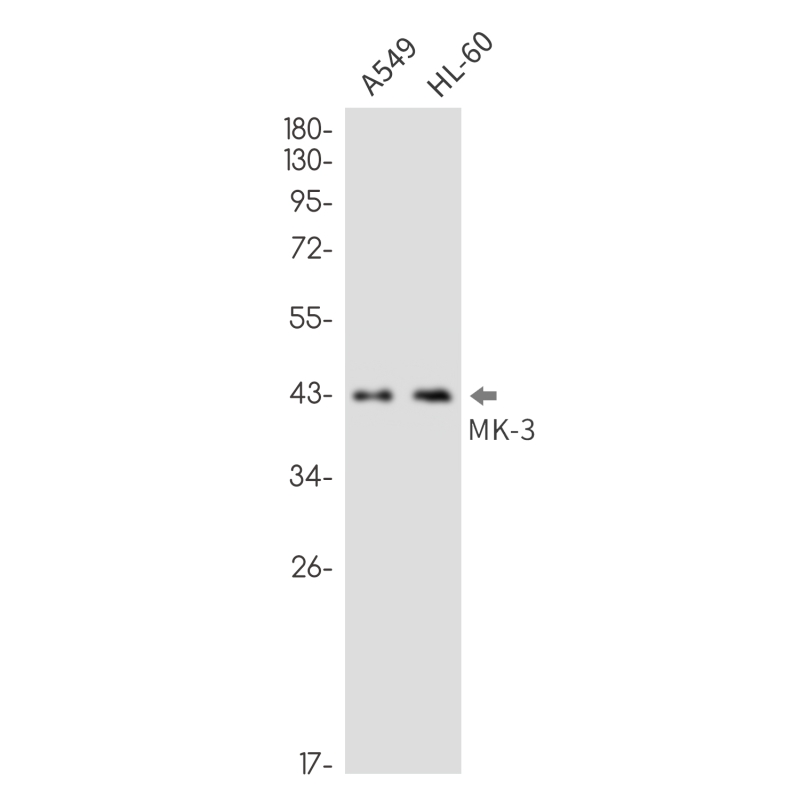
| WB | 1/500-1/1000 | Human,Mouse,Rat |
| IF | 1/20 | Human,Mouse,Rat |
| IHC | 咨询技术 | Human,Mouse,Rat |
| ICC | 技术咨询 | Human,Mouse,Rat |
| FCM | 咨询技术 | Human,Mouse,Rat |
| Elisa | 咨询技术 | Human,Mouse,Rat |
| Aliases | MAPKAPK3; MAP kinase-activated protein kinase 3; MAPK-activated protein kinase 3; MAPKAP kinase 3; MAPKAP-K3; MAPKAPK-3; MK-3; Chromosome 3p kinase; 3pK |
| Entrez GeneID | 7867 |
| WB Predicted band size | Calculated MW: 43 kDa; Observed MW: 43 kDa |
| Host/Isotype | Rabbit IgG |
| Antibody Type | Primary antibody |
| Storage | Store at 4°C short term. Aliquot and store at -20°C long term. Avoid freeze/thaw cycles. |
| Species Reactivity | Human |
| Immunogen | A synthetic peptide of human MK-3 |
| Formulation | Purified antibody in TBS with 0.05% sodium azide,0.05%BSA and 50% glycerol. |
+ +
以下是关于MAPKAP Kinase 3(MK3/MAPKAPK3)抗体的参考文献示例:
1. **"MAPKAP kinase 3 is critical for lipopolysaccharide-induced TNF-α production in macrophages"**
- **作者**: Heidenreich, O. et al.
- **摘要**: 研究使用MK3抗体验证巨噬细胞中MK3蛋白表达水平,发现MK3缺失显著抑制LPS诱导的TNF-α生成,提示其在炎症信号中的调控作用。
2. **"Distinct substrate specificity of MK2 and MK3 mediates phosphorylation dynamics in the p38 MAPK pathway"**
- **作者**: Ronkina, N. et al.
- **摘要**: 通过MK3特异性抗体对比MK2/MK3的底物磷酸化差异,揭示了二者在p38通路中不同的时空调控机制。
3. **"MAPKAPK3 regulates cell cycle progression and proliferation via interaction with CDK1"**
- **作者**: Engel, K. et al.
- **摘要**: 利用MK3抗体进行免疫沉淀和Western blot,证明MK3与CDK1互作,调控G2/M期转换及细胞增殖。
4. **"MAPKAPK3 expression correlates with disease severity in rheumatoid arthritis"**
- **作者**: Zhang, Y. et al.
- **摘要**: 通过免疫组化分析滑膜组织,MK3抗体显示其高表达与关节炎患者炎症程度正相关,提示其作为治疗靶点的潜力。
(注:以上文献为示例,实际引用时需核实具体信息。)
The MAPKAP Kinase 3 (MAPKAPK3), also known as 3pK, is a serine/threonine protein kinase involved in the p38 mitogen-activated protein kinase (MAPK) signaling pathway. It is activated by upstream kinases, particularly p38 MAPK, through phosphorylation in response to cellular stressors such as cytokines, UV radiation, or osmotic shock. MAPKAPK3 regulates diverse cellular processes, including inflammatory responses, cell proliferation, apoptosis, and cytokine production. Its role in modulating transcription factors (e.g., CREB, ATF1) and mRNA-stabilizing proteins (e.g., TTP) underscores its importance in stress and immune signaling.
Antibodies targeting MAPKAPK3 are critical tools for studying its expression, activation, and interactions in biological systems. These antibodies are widely used in techniques like Western blotting, immunohistochemistry, and immunofluorescence to detect endogenous MAPKAPK3 in tissues or cultured cells. Specific antibodies can distinguish phosphorylated (active) forms from total protein, aiding in pathway activity analysis. Research utilizing MAPKAPK3 antibodies has linked its dysregulation to diseases such as cancer, autoimmune disorders, and chronic inflammation, highlighting its potential as a therapeutic target. Validation of antibody specificity, often via knockout controls, ensures reliable detection, minimizing cross-reactivity with related kinases like MAPKAPK2.
×